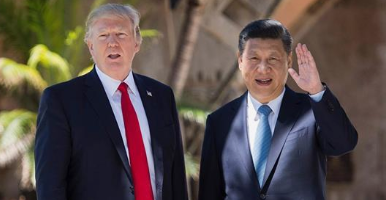Reports from Chinese state media was all over the interwebs this week as it attacks the White House for escalating the prospect of a trade war, calling the administration of president Donald Trump "selfish" and "rude" and "mundane" in its capriciousness.
China retaliates against Trump's $50bn in tariffs, escalating possibility of trade war, by threatening their own tariffs upon the US.
"The unpredictability of [the] Trump administration has become mundane, or even boring for China," an editorial in the state-run tabloid Global Times said on Sunday, June 17, 2018.
"It reinforces the difference in images of the two countries: one challenges the foundation of global trade through sudden attacks; and one that is prepared to defend itself in a trade war that it cannot avoid."
On Friday, the US unveiled a list of $50bn in Chinese goods to target with 25% tariffs, pledging more duties if China retaliated. Within hours, China released its own list of retaliatory tariffs to place on $50bn in US imports.
In addition, an editorial in the People's Daily on Saturday has stated that the latest trade provocations had allowed China "to see more clearly the face of the Trump administration, one that is rude, unreasonable, selfish and headstrong".
China's official Xinhua news agency added: "The wise man builds bridges, the fool builds walls. With economic globalization there are no secluded and isolated islands."
China's proposed tariffs on more than 500 categories of US goods, a list more extensive than the one it released in April, appear aimed at hurting Trump's Republican base before the US midterm elections in November. The list includes beef, poultry, pork, dairy products, seafood, tobacco and soybeans. China is the largest buyer of US soybeans. Beijing said it would also target $16bn of US products like coal, crude oil, natural gas, and medical equipment at a later date.
US tariffs that affect more than 800 Chinese products worth $34bn in annual trade are due to come into effect on 6 July.
The White House said it would consult on tariffs on the other $16bn of products, and would apply these later.
The US wants China to stop practices that allegedly encourage transfer of intellectual property - design and product ideas - to Chinese companies, such as requirements that foreign firms share ownership with local partners to access the Chinese market.
However, many economists and businesses in the US say the tariffs are likely to hurt some of the sectors the administration is trying to protect, which depend on China for parts or assembly.
On the other hand, the situation could still escalate. US trade representative Robert Lighthizer has said the White House will release a plan by the end of the month on restricting Chinese investment in the US and limiting Chinese purchases of advanced technology from the country.
"The economic damage of the tariffs announced so far won't be too big in the scheme of things. But that could quickly change," said Roland Rajah, the director of the international economy program at the Lowy Institute in Sydney.
Chinese state media still left room for the possibility of negotiations. "Given the frequent flip-flopping of the Donald Trump administration, it is still too early to conclude that a trade war will start," said an English-language editorial in the China Daily.








